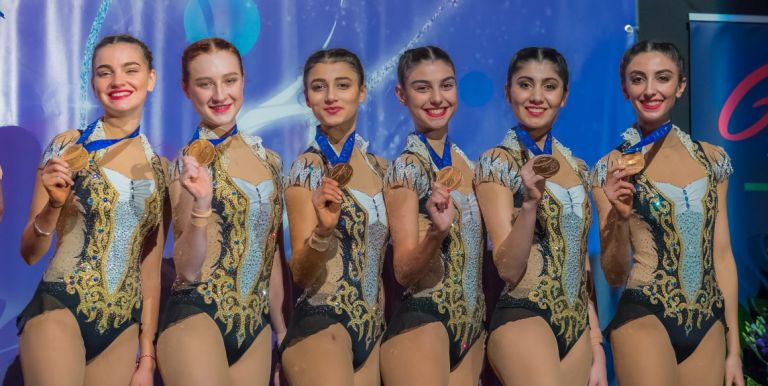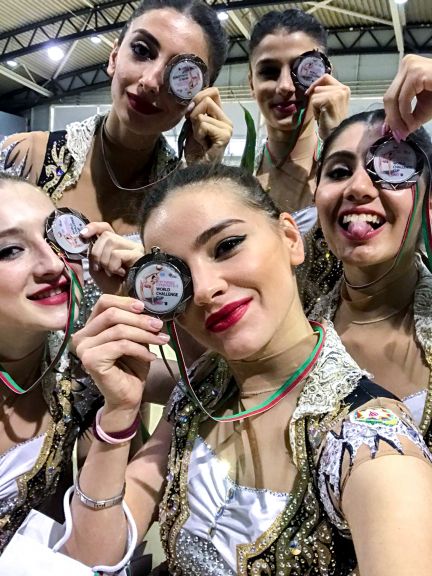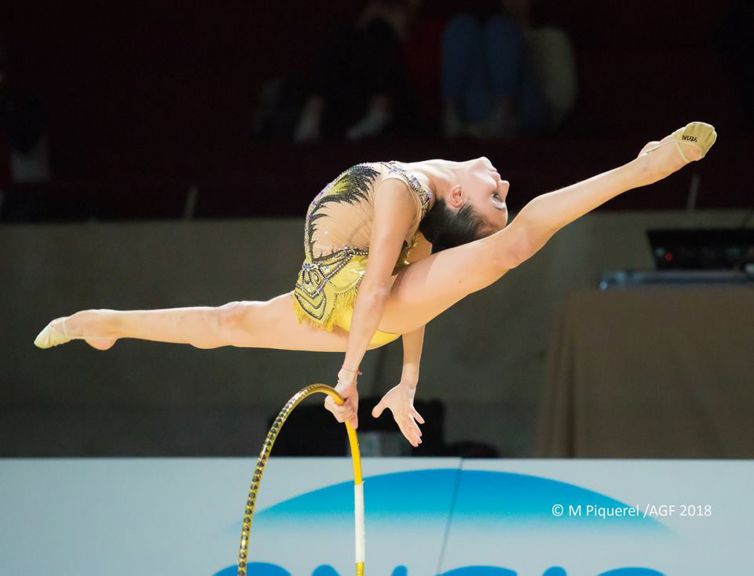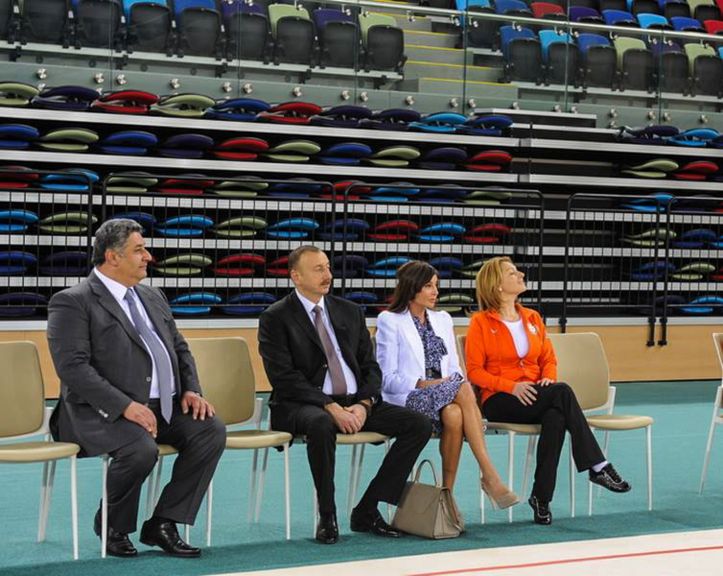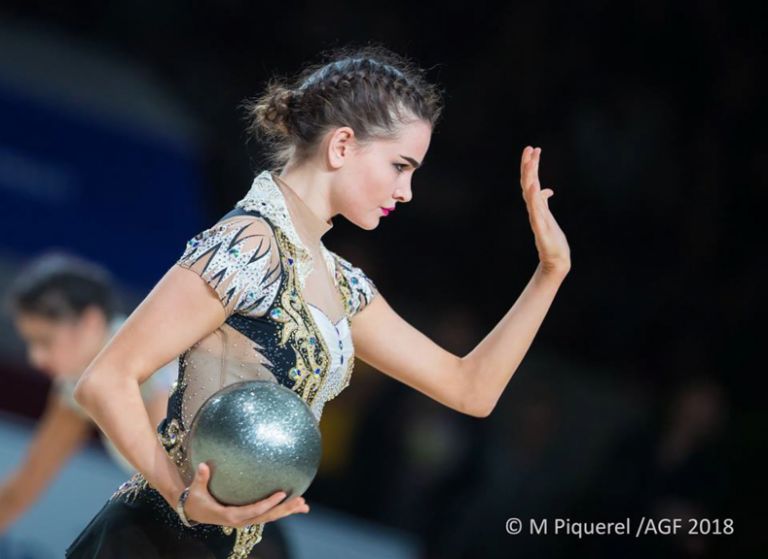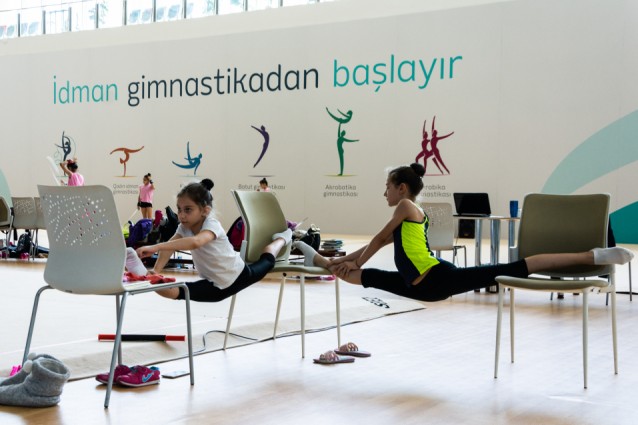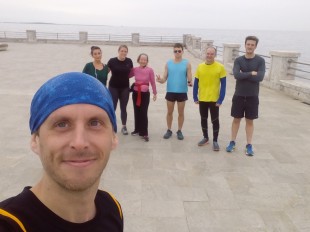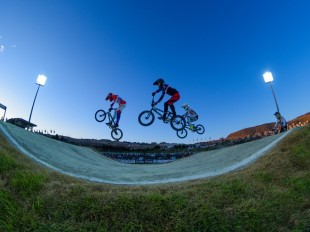For some, sports are entertainment. For others, they become a whole way of life. For Ms Mariana Vasileva, the head coach of the Azerbaijan National Rhythmic Gymnastics Team, professional sport has become her life, love and work. Fellow Bulgarian Aurelia Nasirova was able to catch up with her and learn more about her passionate involvement in Azerbaijan’s gymnastics world.
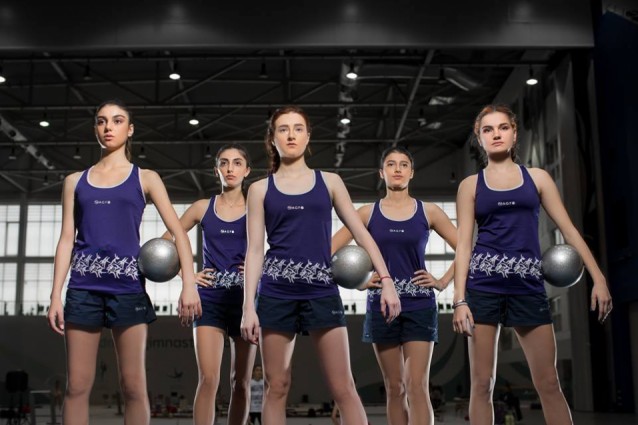 The Azerbaijani senior girls team poses for a photo shoot exhibiting a new outfit designed by Menzer Hajiyeva. Photo: courtesy of Mariana Vasileva
The Azerbaijani senior girls team poses for a photo shoot exhibiting a new outfit designed by Menzer Hajiyeva. Photo: courtesy of Mariana Vasileva
VoA - How long have you been involved in sport?
MV - I got involved in sport at a serious level when I was five years old and living in the city of Targovishte, in Bulgaria. At that age I started to do ballet and rhythmic gymnastics. But at that time, I had to choose which one I would specialise in. I chose rhythmic gymnastics right away. After I finished competing, I entered the institute. After graduation, I started to work as a coach.
For 10 years, you have been working in Azerbaijan training the national rhythmic gymnastics team.
Yes, 10 years. When I started working here, I had only five gymnasts. At that time, the sport wasn’t as well developed in Azerbaijan. Other former Soviet republics, such as Russia, Belarus and Ukraine were leaders in the sport… even Georgia was doing quite well. But in Azerbaijan, there was no tradition of rhythmic gymnastics. Of course, there were athletes and coaches back then, but not at such a high level as we have now. The team’s former coach, Ms Sara Valiyeva, she’s 83 now, she still comes to all our competitions. She was one of the first rhythmic gymnastics coaches in Azerbaijan. She has always supported me, even from the beginning of my career when it was difficult to get things going here. She often visits our training sessions, and we give her the opportunity to award winners. She is part of our team.
To date, there are 64 gymnasts on the national team of Azerbaijan. In the beginning, there were only five. The most important factor that helped us reach where we are now is the president of our federation, Mrs Mehriban Aliyeva. She is a very active, successful and intelligent woman. She showed us the importance of placing sport first. I admire her and am happy to work under her management. Also, in order to achieve these results, we had to increase the number of athletes, as without quantity, there is no quality. But now we already have both quality and quantity. For nine years, we have returned from European competitions with medals.
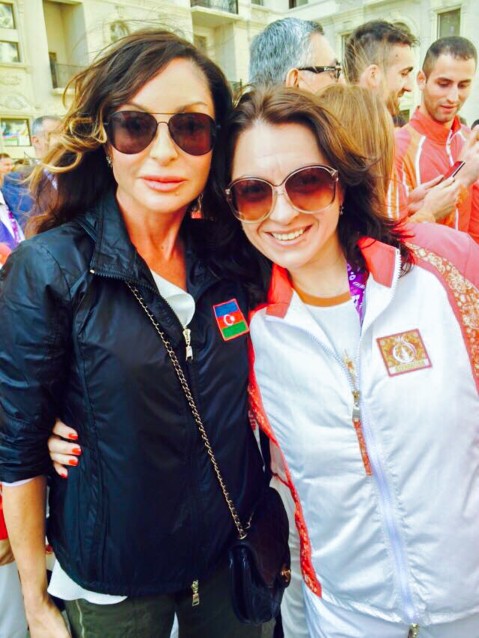 First Vice-President of Azerbaijan Mehriban Aliyeva and Head Coach of the Azerbaijan National Rhythmic Gymnastics Team Mariana Vasilevna at the 2015 European Games in Baku. Photo: courtesy of Mariana Vasileva
First Vice-President of Azerbaijan Mehriban Aliyeva and Head Coach of the Azerbaijan National Rhythmic Gymnastics Team Mariana Vasilevna at the 2015 European Games in Baku. Photo: courtesy of Mariana Vasileva
Tell us a little about this beautiful Gymnastics Arena.
There are separate halls for training and for competition. There is no other complex like this one. It has everything we need. Mehriban khanim played a leading role in its establishment. She asked us what we needed, and I told her we needed a school, because our children cannot be high-level athletes if they have to attend a regular school. They would come tired from class, plus the time spent in transportation to get here means they would only get half a day to spend in training. It wasn’t possible to give them quality training in that time. But we cannot have silly, uneducated athletes. As we discussed this with Mehriban khanim and her husband, President Ilham Aliyev, they said they would do what they could to help us. As a result, and thanks to the minister of education, we now have a school at the complex. Teachers come and conduct classes for grades five to 11, and parents are kept informed of their children’s progress by email.
Do your athletes live here at the complex or travel here from home every day?
The best athletes who are preparing for the European Championships and World Cups live here. It is hard to combine classes and training with travelling back and forth to home. We have 48 beds for them in beautiful rooms. We also have modern medical facilities with up-to-date technology, a fitness centre, sauna and jacuzzi. At the moment we are planning a new project to create a swimming pool. The children’s bodies are growing, and while this is a good time to shape them, they also need to rest from training. Swimming is the best sort of restorative activity for their growing bodies.
From what age do you accept children into your school?
We accept children starting at grade five. By 12 years old, they are ready to enroll in the national team of Azerbaijan. Of course, there are exceptions for talented children from the regions.
Is your school the only place where a parent can bring their child for rhythmic gymnastics?
Of course not. In 10 years, we opened 15 branches in 15 regions of Azerbaijan. Three more are expected to open soon. Currently 1,250 children are training in these regions. Actually, right now there is a lack of coaching staff. Many athletes are entering professional sport. Over the last 10 years, we have already fostered a generation of professional rhythmic gymnasts here in Azerbaijan.
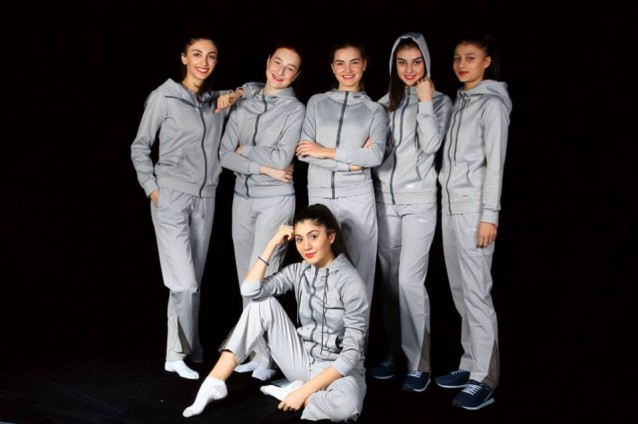 The senior team during a photo shoot advertising new national team outfits, January 2018. Photo: courtesy of Mariana Vasileva
The senior team during a photo shoot advertising new national team outfits, January 2018. Photo: courtesy of Mariana Vasileva
How much time per day do you work?
All our team, the coaches, medical staff, massage therapists, everybody works 10 hours a day. I’m very grateful for all their hard work. They are all people who want to work in the sphere of professional sport. Professional sport is like a jungle – only the strongest survive.
What does the daily routine of your athletes look like?
The morning starts at 7:30am with an obligatory walk in the fresh air. Then breakfast, massage, ballet, training sessions, relaxing massage, school, lunch and acting skills. Separate lessons of English and Azerbaijani are also taught, followed by more training sessions. The schedule is very tight. The loads are serious.
What is the most memorable victory you’ve had in your life?
I’ve had several of them. But one of the biggest was winning the bronze medal as a group in the European Championships in Minsk in 2011. This was a turning point in rhythmic gymnastics in Azerbaijan. We believed in victory. I believed it. The children believed. God helps the courageous. He helps those who work honestly. We got the first performance slot and that was a big test. The first one is always very difficult. The most memorable moment of that competition was when we were in a long narrow corridor leading to the entrance of the arena. The girls lined up, one after the other, and I followed them. As they went, I told them to believe in themselves, believe in victory, and they would have a medal. At that moment, they started singing the anthem of Azerbaijan. It was exciting for all of us. What else could I say to them at that moment? The closer they got to the arena, the louder we heard the voices singing and it rattled the whole hall. That day we won several bronze medals. For us it was a great victory. To defend the honour of their country became the goal of my students at that moment. I will never forget it.
Is everyone in your family involved in professional sport?
Yes, except for my younger daughter. She wanted to, but I was against it. I think we need to see the talent in our children without being guided by our own ambitions. Each of us was born for his own life mission. A person must learn what they are capable of and fight for it. They should enjoy what they do. My older daughter is on the Azerbaijani national rhythmic gymnastics team. For her, first of all, I’m a coach and then a mum. My husband is also a coach. We see each other very little. I have training and competitions; he has training, meetings and matches. But we manage to find time together to share our successes and failures. Because we have both been in professional sport for so many years, we understand each other.
What would you say to young people who want to do sport, whether professionally or simply for their health?
Professional sport is not for health. I can say this with authority. If someone thinks that doing sport professionally will keep them healthy, they are mistaken. A person must know if they have the strength to do it, or if they would be better off finding something they are more capable of doing. I wish everyone would do sport, regardless of whether it’s as a hobby or a profession. Sport teaches you a lot. It tempers you and teaches discipline from an early age. And discipline is the most important thing in life. Without it, you will not achieve anything. It doesn’t matter what you do. Discipline comes first, then strength, courage and a winning spirit. But if you have all the others without discipline, you cannot be a professional athlete. And of course, the people that surround us play a big role, as they share their support and professionalism with us. The love of people and the support of fans is very important. One must not only be able to win, but to lose and get up again and keep going forward.
What is Azerbaijan for you personally?
For me, it’s everything! I found myself here in this beautiful country. My family realized themselves here. Here we receive so much love from people. We’ve had the opportunity to realize ourselves as athletes and as professionals. We have so many friends here. My family, my home and my whole life is here.
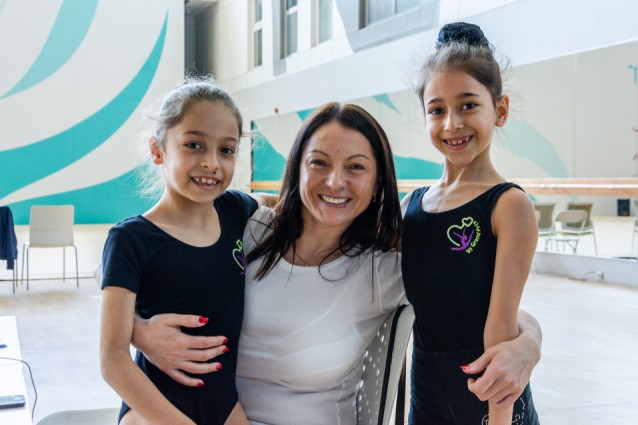 Mariana with two of her young trainees at the National Gymnastic Arena, May 2018. Photo: Aurelia Nasirova
Mariana with two of her young trainees at the National Gymnastic Arena, May 2018. Photo: Aurelia Nasirova
About the author: Aurelia Nasirova is a Bulgarian freelance writer and photographer who is currently living and working in Baku.
